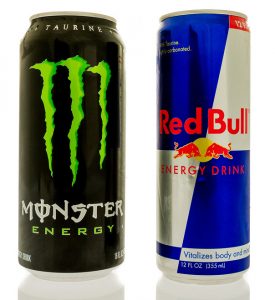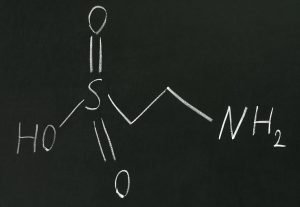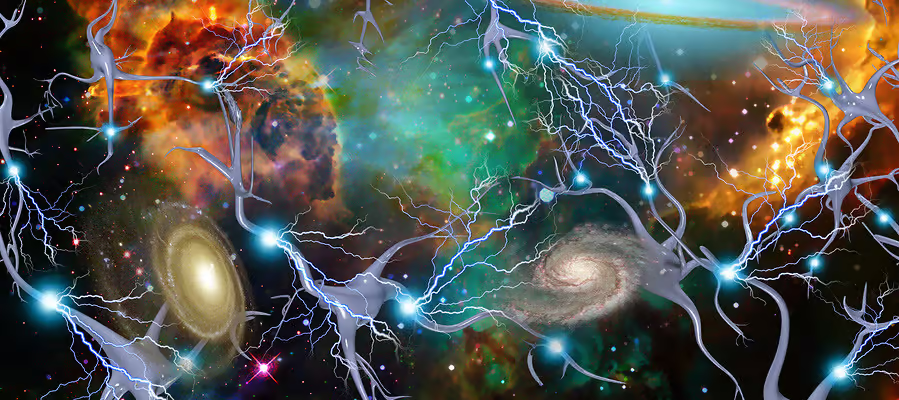Table of Contents
Key Takeaways
- Taurine, an abundant amino acid found in various tissues of the body, can be safely added to a nootropic stack, and its association with energy drinks is distinct from its nootropic benefits.
- As a nootropic, taurine functions as a neurotransmitter, protects brain cells, promotes neurogenesis, and supports memory and mood.
- Taurine may positively impact anxiety, depression, and ADHD by influencing brain signaling and inflammation regulation.
- Taurine shows potential therapeutic benefits for conditions like autism, OCD, and epilepsy, though individual responses may vary.
- The recommended daily dosage of taurine as a nootropic supplement is 500 mg – 2 grams, and it is generally safe, with minimal side effects.
Taurine (2-aminoethane-sulfonic acid) is one of the most abundant amino acids in your brain, spinal cord, eyes, and nearly every tissue in your body.
Every region of your brain including the retina in your eyes contains or takes up the amino acid taurine.
 You may be familiar with taurine only because it’s a featured ingredient in popular energy drinks like Red Bull, Rock Star, NOS, Amp, Full Throttle, and Monster.
You may be familiar with taurine only because it’s a featured ingredient in popular energy drinks like Red Bull, Rock Star, NOS, Amp, Full Throttle, and Monster.
Occasionally we’ll see a story about sudden death or seizure from consuming as few as 3 – 4 cans of some energy drink. And because taurine is the featured ingredient many assume that taurine is the problem.
Turns out that adding taurine to your nootropic stack is perfectly safe. The hidden issue often missed in the news is energy drink caffeine content ranging from 80 – 300 mg per can.[i]
Everyone from athletes to exhausted soccer moms grab a Red Bull® to improve performance and make it through their day.
But a better option is to avoid the sugar-laden energy drink. And stack a taurine supplement with a cup of coffee or green tea. For a similar effect. Without the negatives.
In this review we’ll dive into all the of the nootropic benefits provided by supplementing with taurine.
Taurine helps:
- Neurotransmitters. Taurine functions as a neurotransmitter and neuromodulator in your brain. Activating GABA and glycine receptors which affects memory and mood and prevents seizures.[ii]
- Neuroprotectant. Taurine protects brain cells by reducing intracellular free calcium (Ca2+) concentrations.[iii] It is a potent antioxidant, protects from mitochondrial dysfunction, modulates energy metabolism within cells, modulates genes to induce longevity, inhibits cellular stress associated with Alzheimer’s, acts as ‘quality control’ in brain cell health, and protects against stroke.[iv]
- Neurogenesis. Taurine increases stem cells and progenitor cells (neural precursor cells) in your brain including the aging hippocampus and increases the survival of newborn neurons (neurogenesis).[v]
What is Taurine?
Taurine (2-aminoethane-sulfonic acid) is one of the most abundant amino acids in your body.
Taurine is synthesized in your body from methionine and cysteine via cysteinesulfinic acid decarboxylase (CSD).[vi]

Taurine is a “conditional” amino acid because some of this amino acid is synthesized naturally in your body. And you get the remaining taurine your body requires from eating seafood, meat, poultry, and eggs.
Taurine was discovered by German scientists Friedrich Tiedemann and Leopold Gmelin in 1827 who first extracted it from ox bile. It’s named after the Latin taurus which means bull or ox.
Since taurine is found almost exclusively in animal-based foods, many vegans and vegetarians are at risk for taurine deficiency.[vii]
Science also shows that taurine levels decline with age.[viii] Possibly because the aging body and brain cannot supply enough of the precursors required to synthesize taurine.[ix]
The structure of taurine has two primary differences from essential amino acids.
First, taurine’s amino group is attached to a beta-carbon instead of an alpha-carbon. And second, the acid group in taurine is sulfonic acid, instead of carboxylic acid like in other amino acids.[x]
Because of this distinctive structure, taurine is not used in the synthesis of proteins in your body and brain. Instead, it provides a host of other benefits which we’ll cover in this review.
The more we learn about taurine, the more we realize it is one of the most essential substances in the human body.
After extensive animal studies showing all the benefits of taurine, scientists in Japan were curious if there was a correlation in human health.
Using data from a WHO study covering 61 populations in 25 countries they confirmed that populations with the highest levels of taurine in their system lived the longest.[xi]
As a nootropic, taurine is essential for minimizing damage from beta-amyloid proteins associated with Alzheimer’s, protecting against environmental toxins, preventing mitochondrial dysfunction, and supporting the inhibitory GABA system.
Taurine is needed for promoting long-term potentiation for memory formation, reducing brain inflammation, stimulating growth of new neurons (neurogenesis), and protecting your brain from the damaging effects of stroke.
How does Taurine work in the brain?
Taurine boosts brain health and function in several ways. But two in particular stand out.
- Taurine may help anxiety and depression. If you deal with anxiety or depression you know the negative effects on learning, work and your quality of life. Supplementing with taurine as a nootropic may help.[xii]
Research shows that taurine may help alleviate depression by changing depression-related signaling cascades in the hippocampus.[xiii]
One human study with 121 bipolar patients aged 18 – 25 demonstrated a reduction in manic episodes when supplemented with taurine.[xiv]
And several animal studies have shown taurine nootropic supplementation may help in the clinical treatment of anxiety. By modulating the GABA and glycine receptors in the brain. And preventing neurotoxicity and mitochondrial energy failure.[xv]
- Taurine is anti-aging. Studies show that taurine levels fall as you get older. And supplementing with taurine seems to slow the brain aging process.[xvi]
Taurine protects brain cells from pesticides and heavy metals such as lead.[xvii] It helps prevent mitochondrial dysfunction and regulates calcium levels.[xviii] And taurine prevents toxicity by reversing declines in the inhibitory GABA system.[xix]
Taurine supplementation reduces inflammatory processes caused by excessive iron accumulation that can lead to Alzheimer’s and Parkinson’s.[xx] And it stops Amyloid-β from damaging mitochondria by activation of the SIRT 1 gene which helps prevent Alzheimer’s.[xxi]
Taurine also plays a critical role in creating new brain cells (neurogenesis). Research has found that taurine activates dormant stem cells in the brain.[xxii] And boosts the survival of new neurons which results in an increase in adult brain cells.
How things go bad if you are low in Taurine
Some taurine is produced in your body from methionine and the amino acid cysteine. But the remainder must come from your diet. If you are vegan or vegetarian, chances are high that you are not getting enough taurine.
Diseases such as diabetes, cancer, liver disease, kidneys or heart can also deplete taurine. As can deficiencies in Vitamin B6 (P-5-P), zinc, magnesium and Vitamin A. And eating food containing monosodium glutamate (MSG).
Insufficient taurine means:
↓ reduced GABA can lead to anxiety and depression
↓ vision problems
↓ oxidative stress destroys neurons and synapses in the central nervous system
↓ insulin resistance
↓ Brain-derived neurotrophic factor (BDNF) declines
Taurine is one of the least expensive nootropic supplements there is. So if there the slightest doubt you are getting enough taurine then add it to your nootropic stack.
Taurine benefits
Taurine is the most abundant amino acid that you’ve never heard of. Strong evidence suggests taurine could be the secret factor in the world’s longest-living populations.[xxiii]
Studies show taurine:
- Critical for normal human brain development[xxiv]
- Prevents mitochondrial dysfunction within brain cells
- Supports GABA in your brain preventing neurotoxicity & stress
- Reduces inflammation that can lead to Alzheimer’s and Parkinson’s
- Stimulates neurogenesis which is anti-aging
- Shields brain cells from stroke-induced brain cell damage
- Prevents beta-amyloid damage that could lead to Alzheimer’s
- Protects brain cells from heavy metals and pesticides
- Needed along with NMDA and dopamine receptors for long-term potentiation needed for long-term memory formation[xxv]
And here we’re only investigating taurine’s effects on your brain. This essential amino acid can also restore insulin sensitivity, mitigate diabetic complications, reverse symptoms of heart disease, prevent and treat fatty liver, and reverse tinnitus.
If you are interested in living a longer, healthier and more active life, consider adding taurine to your nootropic stack.
How does Taurine feel?
 Neurohackers report that supplementing with taurine is a simple way to support energy levels.
Neurohackers report that supplementing with taurine is a simple way to support energy levels.
Sleep is better, and taurine may be a safe alternative to prescription sleep meds.
Most people using taurine report sharper eyesight. Muscle pain is reduced, less depression, and no more insulin resistance.
Some report that adding taurine to their nootropic stack helped relieve chronic fatigue syndrome.
Supplementing with taurine may reduce blood pressure and is effective in reducing the occurrence of atrial fibrillation.
If you have issues after eating food containing monosodium glutamate (MSG), taurine can help eliminate the headache and nausea.
Taurine Clinical Research
Taurine for autism
Autism spectrum disorder is thought to be associated with oxidative stress caused by reactive oxygen species (ROS). So oxidative stress could be a potential target for therapeutic intervention for autism.
Methylation capacity, sulfate levels, and total glutathione levels are decreased in autism. On the other hand, oxidative glutathione and the ratio of oxidative to reduced glutathione are increased.
So decreasing oxidative stress might be a potential treatment for autism.[xxvi]
Taurine is a well-known antioxidant and regulator of inflammation. Researchers in New York tested 66 children aged 1.5 – 11.5 years who were diagnosed with autism. And the controls in this study were the kids’ healthy siblings and parents.
The study found that 21 out of 66 autistic children had low taurine concentrations. The researchers concluded the data implied that taurine may be a valid biomarker for at least some with autism.[xxvii]
Taurine may help ADHD
Studies have shown low dopamine uptake in the prefrontal cortex and striatum segments of the ADHD brain.
A very recent study conducted in Taiwan revealed that high-dose taurine calmed hyperactive behavior and brain signaling in ADHD rats.
Taurine significantly affected dopamine transporter levels, dopamine uptake and brain-derived neurotrophic factor (BDNF) expression.[xxviii]
Mounting evidence in ADHD research also suggests a strong relationship between inflammation and ADHD.
Elevated levels of inflammatory cytokines such as interleukin (IL)-1 and C-reactive protein are turning out to be diagnostic markers of ADHD. These cytokines induce changes in dopamine and norepinephrine in the prefrontal cortex.
A recent study in Taiwan showed that high-dose taurine significantly reduced interleukin (IL)-1 and C-reactive protein which in turn reduced hyperactive behavior.[xxix]
Taurine for OCD
Studies show that patients with OCD have increased glutamate activity and decreased GABA in the brain. And it could be genetic.
One specific gene (SLC1A1) codes for transporters to clear excess glutamate from synapses, and boost GABA production.[xxx] If you are missing this gene you’ll have problems with glutamate and GABA and likely experience symptoms of OCD.
GABA plays a critical role in regulating excitability in neuronal networks in your brain. Taurine has been proven to activate GABA receptors and even boost GABA levels in your brain.[xxxi] Helping to reduce symptoms of OCD.
Taurine for epilepsy
Read the reviews of taurine supplements and now and again you’ll see someone mention that consistent use of taurine reduces the severity and number of seizures they experience.
Imbalances between excitatory and inhibitory neurotransmitters appear to be the mechanism of epileptic seizures. And taurine serves as an inhibitory neuromodulator.
GABA is the primary inhibitory neurotransmitter in your brain. So the regulation of GABA plays a prominent role in preventing excitability and seizures.
Taurine is a GABAA receptor agonist. High-doses of taurine activate this receptor as well as the glycine receptor which both suppress neuronal firing.
Several clinical studies have been conducted to test the efficacy in using taurine to control epilepsy. Reviews are mixed as only about 1/3 of patients respond favorably to taurine therapy.[xxxii] So if you’ve tried everything else with little success you may want to give taurine a try.
Taurine Recommended Dosage
Recommended taurine nootropic dosage is 500 mg – 2 gm per day.
The safe upper limit for taurine is 3 gm per day.[xxxiii]
Instead of getting your taurine from an energy drink, try a taurine supplement with a cup of coffee or tea, and a high-quality BioActive B-Complex supplement. You’ll feel better and get the same benefit.
Taurine is rapidly absorbed and used in your body and brain. But studies show that a single dose won’t do much in providing a benefit you can feel.
Continual, daily, long-term nootropic usage of taurine builds and then maintains adequate levels of taurine in your system.[xxxiv]
With very few exceptions, high doses of taurine are well tolerated without adverse side effects.[xxxv]
Taurine Side Effects
The effects of taurine are well-tolerated and safe for most people. And should not cause any side effects.
High taurine dosage should be avoided if you are dealing with bipolar disorder because it could make your symptoms worse.
Best Type of Taurine Supplements to buy
Taurine is available in capsules and powder form.
Taurine capsules are usually 500 or 1000 mg each.
Avoid trying to get your taurine from energy drinks because the dose is too low for any nootropic benefit. And they are loaded with sugar, caffeine, and other ingredients that are contrary to good health.
I recommend: Life Extension – Taurine
Nootropics Expert Recommendation
I recommend using taurine as a nootropic supplement.
Your body does make some taurine on its own. But the rest must come from meat, poultry, seafood or dairy. Or a nootropic supplement.
Taurine is especially helpful for relieving mental health issues like anxiety, stress, and panic disorder. If you haven’t had much luck with prescription anti-anxiety meds or antidepressants, or other nootropics for anxiety, you may want to try taurine.
For antiaging benefits, and a longer, healthier life you should add taurine to your nootropic stack.
Taurine is essential for a healthy brain, heart, muscles, eyes and hearing.
Taurine is particularly effective for those using levodopa to treat Parkinson’s Disease because this drug depletes taurine in your body.[xxxvi]
Doctors sometimes recommend dosages of taurine up to 6 grams per day for treating high blood pressure, diabetes, congestive heart failure, anemia, cystic fibrosis and after surgery.
But for most neurohackers, up to 2 grams per day of taurine is adequate.
Just avoid trying to get your daily taurine dose from energy drinks. The dose is too low and the risk from the other ingredients in these drinks is too high.
I recommend: Life Extension – Taurine










Join The Discussion - 207 comments
Robert
February 22, 2021
Hi David,
In some of your posts I see that you dont recommend to use medicine with supplements. I take Xanax for ny anxiety, can I take some other supplements with Xanax to support my GABA, like Taurine, Valeriana herb or Skullcap? Thanks a lot.
David Tomen
February 23, 2021
Robert, the problem is excess GABA. If you use something like Valerian with Xanax you could put yourself into a coma very quickly.
The same thing goes for antidepressants like SSRIs. You cannot use L-Tryptophan or 5-HTP because you’ll end up with excess serotonin. Which could result quickly in Serotonin Syndrome.
Robert
February 24, 2021
I take only a small amount of Xanax, 0,5 mg. I think it is better to take 0,5 mg Xanax with a little bit of Kava or Valerian, rather then 1 mg of Xanax (which is still a small dose). What do you think?
David Tomen
February 25, 2021
Robert, some people can get away with this with no problem. It all depends on our system and how your body and brain use these compounds.
But I can’t ethically or morally recommend or even suggest it because it could kill someone.
Robert L
May 7, 2021
Robert,
Just to speak from experience – using Xanax 0.5 is not little, nor is even .25 when used for more than 4 weeks (Read the Med notes that come with your script)
Benzos affect the GABA Receptors to a point of Desensitizing them. By 4 months there is little evidence that benzodiazepines retain their anxiolytic properties… and this is when it doesn’t go well. (De-Realization, Agoraphobia, Nervousness, Insomnia, paranoia and much more (Pain, Heart Palpitations…)
You’ll find that no supplement works to balance out this issue… It becomes a TBI that Supplements tend to help with BDNF – but still takes years to repair.
If you attempt to come off – please see my video
https://www.youtube.com/watch?v=06RbPuP2P0E&t=32s
Phil Caine
February 10, 2021
Hey David, I listened to a number of your podcasts and heard you say you use Taurine daily for its anti ageing ability’s. I’m curious about the anti-aging movement your side and wondered if you use or recommend other anti ageing supplements?
Many thanks
Phil
David Tomen
February 11, 2021
Phil, when you think about it most of the nootropics I’ve reviewed and talk about are anti-aging supplements.
But more specifically, another great one that I don’t currently use but am going to start again is L-Carnosine. Not to be mistaken with L-Carnitine.
But long-term use of L-Carnosine increases lipofuscin in your brain and in your body where it shows up as “age spots”. You can prevent that by using DMAE.
Ryan
February 7, 2021
Hi David,
Thanks for all the valuable information here. I’m considering trying taurine because I have an anxiety that creates a tension in my back that I can’t release. I do have ADD tendencies and OCD as well and really persistent insomnia. I am a different person with a good night’s sleep but I am having such a hard time getting any consistency. Anxiety seems to be my main symtptom, followed by back pain. Tryptophan is quite useful for me as well. GABA helped right away and released the stress in my back, now seems less effective but I will keep using it to see long term effect. I also use l-theanine. I suspect GABA/glutamate issues that are genetic as my mother has the same sleeping issue and consequential pain.
Do you recommend Grapefruit seed extract to increase GABA supplement absorption? I’ve read some disparaging info about GSE latley so I am not sure…
Would you recommend taurine for me? Seems like a good fit to try anyhow.
I also use NAC, B complex, Magnesium, Vit C and D, Lions Mane, Cucumin, and am planning on adding aniracetam, sulbutiamine, performance lab multi (will omit duplicated supp’s then), alpha GPC, L-tyrosine, and DHA.
Would you discourage any of the above? I’m trying my best to address insomnia first but I feel anxiety is a main driver there.
I feel close to getting my issues under control but it has been a roller coaster for a while now. I have such a building anxiety throughout the day that I believe this adds to the cycle of insomnia & intermittent depression. Thanks for your help.
David Tomen
February 7, 2021
Ryan, it looks like you are on the right track. I think you’ll be closer to how you want to feel with the additions you mention.
And don’t worry about GABA absorption. From what I can tell it’s processed in your gut which then makes it to your brain. Let your system take care of that. But keep using GABA because it also boosts Human Growth Hormone too.
And instead of Grape seed extract, you can increase bioavailability of several of these supplements by using BioPerine.
Sven
January 29, 2021
“Taurine is a GABAA receptor agonist. High-doses of taurine activate this receptor”
David how much of a high dose of taurine is needed for GABAA receptor activation? Is 3 grams enough?
David Tomen
January 29, 2021
Sven, 3 grams is definitely enough and likely less although I don’t have the data to prove it.
Sven
January 30, 2021
One more question David. I’ve read that NAC and Taurine interact with one another, is that true? Would it be better to use NAC morning and taurine at evening, or is it ok to take them together at the same time?
David Tomen
January 30, 2021
Sven, N-Acetyl L-Cysteine (NAC) and Taurine are related. Taurine is synthesized in your body from methionine and cysteine.
You can take them together but I prefer using NAC before 4 PM because it supports dopamine receptors. And I don’t want to encourage increased dopamine too late in the day because it interferes with sleep.
Sven
January 11, 2021
David how does taurine differ from l-theanine? I’ve heard a lot of people say that taurine + caffeine works a lot better for them than l theanine + caffeine? Is there anything wrong with using them both? Do they both work synergistically with caffeine or is only using one preferred? I currently use 2g taurine + 200mg l-theanine + 50mg caffeine in a single dose in the morning, is that ok? Would you split the dosages so that I take theanine and taurine once in the morning and once in the evening? Also on top of that I use NAC if that makes any difference
David Tomen
January 11, 2021
Sven, Taurine (https://nootropicsexpert.com/taurine/) and L-Theanine (https://nootropicsexpert.com/l-theanine/) are two very different supplements. I suggest comparing those to pages side by side and you’ll see what I mean.
The stack that you describe is fine and as long as it works for you keep on using it. You may want to reduce your L-Theanine dose to 100 mg instead of 200 mg however. 200 mg can make you sleepy and be counter to what you are trying to achieve.
You could use the same stack minus the caffeine in the evening and it should help you sleep. NAC is another great supplement because it is a precursor to glutathione which is a major component of your immune system. And it supports dopamine receptors as well which makes dopamine more effective.
Dave
December 4, 2020
Great Article. I have a type of bipolar disorder that is related to anxiety induced insomnia. (basically if I go for too many days without sleep I become “manic”). Some people on amazon reviews say that taurine relaxes them, others say it gives them energy. Which is it? I’m considering taking taurine for anxiety and I have to be careful to make sure I don’t take anything that can cause insomnia.
David Tomen
December 4, 2020
Dave, taurine activates GABA and glycine receptors which affects memory and mood and prevents seizures. I suggest scrolling back to the top of this reviews and reading it again. All the way through to the bottom. You’ll have your answer.
Wilma
December 2, 2020
Hello David, do you think a diet with enough meat, around 400 grams a day, gets enough benefits from taurine as a nootropic?
– I would also like to know, please, in which cases would you recommend L Theanine and in which Cases L Taurine?, since their effects seem very similar
David Tomen
December 2, 2020
Wilma, Taurine is an amino acid and works as a neurotransmitter. It helps activate GABA and glycine receptors. Plus provides other benefits described above.
L-Theanine (https://nootropicsexpert.com/l-theanine/) is a completely different supplement. It’s derived from green tea and chemically is similar to glutamine.
Please read each review from top to bottom and compare them. I would recommend Taurine only if you think you are low in taurine. And recommend L-Theanine if you need something calming and to help you think.
Mike
October 24, 2020
Dear Mr. Toman,
You say it is best to take Taurine in the morning with a cup of coffee and a high quality, B-complex supplement. I have been taking Taurine with my morning coffee for years and would like to add B-complex as well. Is it okay to take a B-complex supplement on an empty stomach along with my morning coffee and Taurine?
David Tomen
October 26, 2020
Mike, absolutely because the B-Vitamins are water soluble and are happy to enter your system anytime you decide to take them.